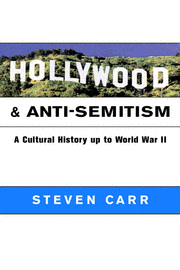Book contents
- Frontmatter
- Contents
- List of Illustrations
- Acknowledgments
- Introduction: What Is the Hollywood Question?
- Part 1 The Hollywood Question and American Anti-Semitism, 1880–1929
- Part 2 The Hollywood Question for a New America, 1929–1941
- Part 3 The Hollywood Question, 1941 and Beyond
- Notes
- Bibliography
- Index
Introduction: What Is the Hollywood Question?
Published online by Cambridge University Press: 10 December 2009
- Frontmatter
- Contents
- List of Illustrations
- Acknowledgments
- Introduction: What Is the Hollywood Question?
- Part 1 The Hollywood Question and American Anti-Semitism, 1880–1929
- Part 2 The Hollywood Question for a New America, 1929–1941
- Part 3 The Hollywood Question, 1941 and Beyond
- Notes
- Bibliography
- Index
Summary
GABLER'S PARADOX
The end of an era in American history has brought a remarkable degree of cultural ferment, no doubt the result of large-scale shifts taking place in national and international affairs. One finds this ferment imbuing discussions of both internal domestic affairs and the nation's role in a shifting global order. In 1990, Germany completed its reunification as the Soviet Union crumbled. Amid the biggest bank failures and bailouts in United States history, American conservatives cast this successive chain of international events as a victory for Western capitalism over communism. With the purported fall of communism, however, American political discourse lost one of its most potent, influential images. The specter of communism – the so-called Red Menace that had haunted American popular consciousness since World War I and that had structured the virtual entirety of United States post–World War II foreign policy – was suddenly gone. The very raison d'être for blacklisting, national security, “police actions,” missile crises, Vietnam, arms races, and nuclear holocausts had seemingly crumbled into powdery oblivion.
As one demon corroded from public consciousness, others quickly took shape. Iraq moved its troops across the Kuwaiti border in the summer of 1990, triggering a series of events that helped redefine post–Cold War American foreign policy in terms of ready access to the world's petroleum resources. Meanwhile, Operation Desert Storm coincided with what Evan Carton has dubbed Operation Campus Storm. As a still undisclosed body count continued to rise in Iraq, American popular culture fretted over didactic campus leftists.
- Type
- Chapter
- Information
- Hollywood and Anti-SemitismA Cultural History up to World War II, pp. 1 - 20Publisher: Cambridge University PressPrint publication year: 2001



